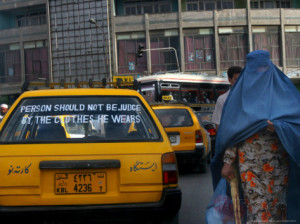Kabul Taxi takes Afghan satire to an unexpected pitch. Now for the movie
Cometh the hour, cometh the Facebook page. All the American investigative journalism training grants (and there have been many and they have cost a fortune) could not have imagined this. A subversive, satirical, punchy Facebook page on Afghanistan’s quarrelsome politicians, insular community leaders, corrupt officials and powerful warlords.
Kabul Taxi, the Facebook page in question, shines the laser light of satire on Afghanistan’s fractious and tribal politics. It’s become hugely popular in just three months, with 13,000 Facebook “likes”.
The anonymous creator has constructed it so that he is constantly picking up prominent Afghan officials in his imaginary taxi. As they travel around the Afghan capital, the driver discusses politics, the economy and culture with the person in the back seat. In this way, he’s able to portray the realities of Afghanistan’s power equations and political machinations and the corrosive way in which group interest is promoted over and above the greater common good.
Each Kabul Taxi post is penned in Dari. (FYI: For those who do not read Dari, the Bing translation is worse than useless. Perhaps Kabul Taxi might consider providing a scant line in English as well?)
Anyway, as The Washington Post admiringly said: “No one is spared. Kabul Taxi picks equally on officials linked to President Ashraf Ghani and those aligned with Abdullah Abdullah, Ghani’s former electoral rival and current partner in the power-sharing government brokered by the United States.”
Being an equal opportunities offender is probably wise. Kabul Taxi can’t really be accused of serving as a Facebook sandwich board for any one group (except possibly the Hazaras, who are often given sympathetic consideration (and rightly so, though most non-Hazara Afghans won’t say that).
According to The Post, the reclusive Kabul Taxi “driver” claims to be 31 years old and says he launched his Facebook page because of the “tumultuous situation…unemployment, poverty and violence”. He decided to use a taxi as a device because in it “you face different people, and diverse conversations take place about politics, economy, art, culture and philosophy. Sometimes there are passengers who talk about politics from pickup point to destination point. Taxi drivers are connected with the daily lives of the people.”
Most journalists would agree, routinely interviewing taxi drivers in cities around the world for their (opinionated) take on issues of the day. (In India, of course, foreign correspondents also like to try the local teashop for quick opinion polls and editorial comment).
Anyway, back to Kabul Taxi – it’s giving a hell of a ride to Afghan politicians and its fans seem happy. “I pray for your fuel tank to be always full,” wrote one fervently.


